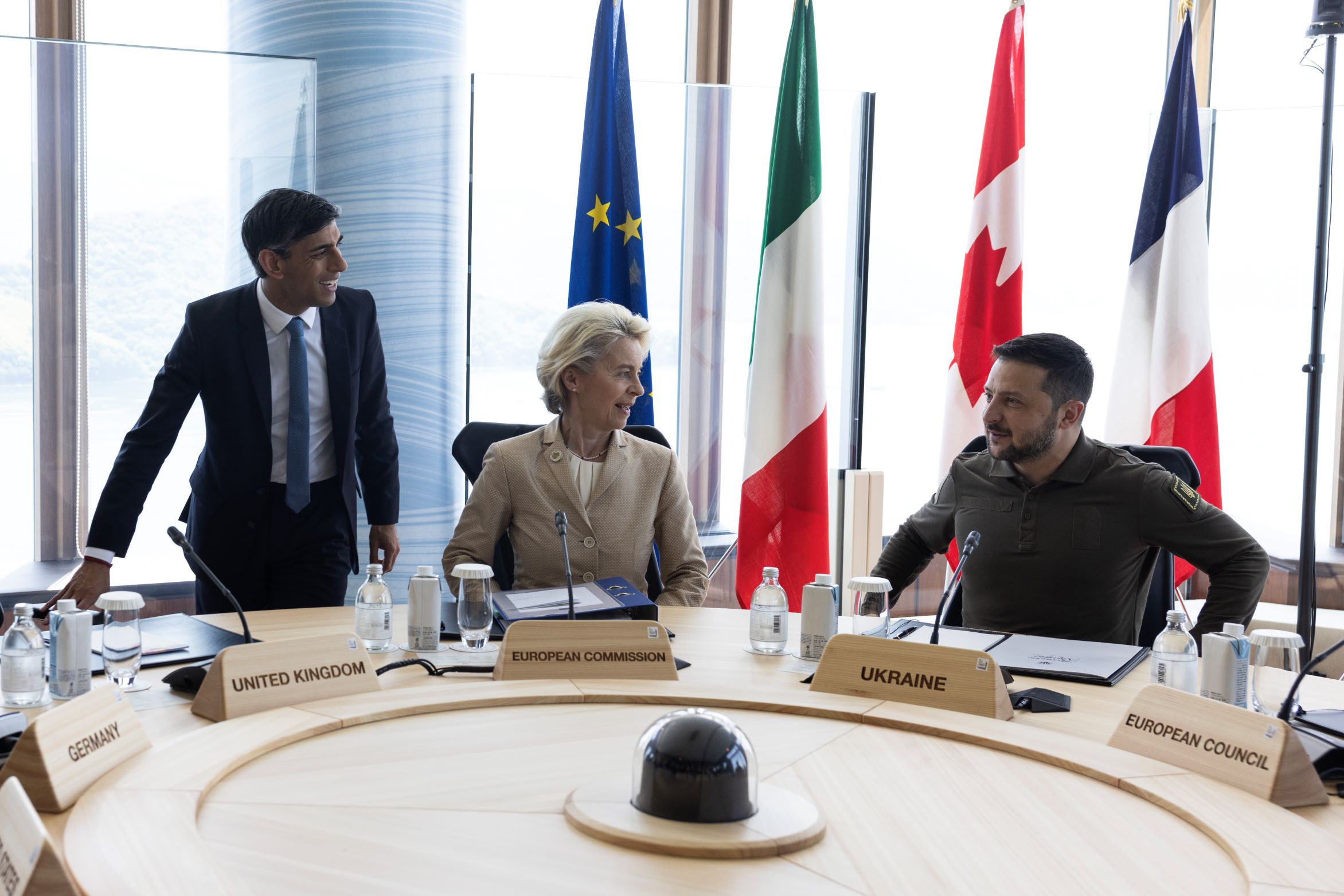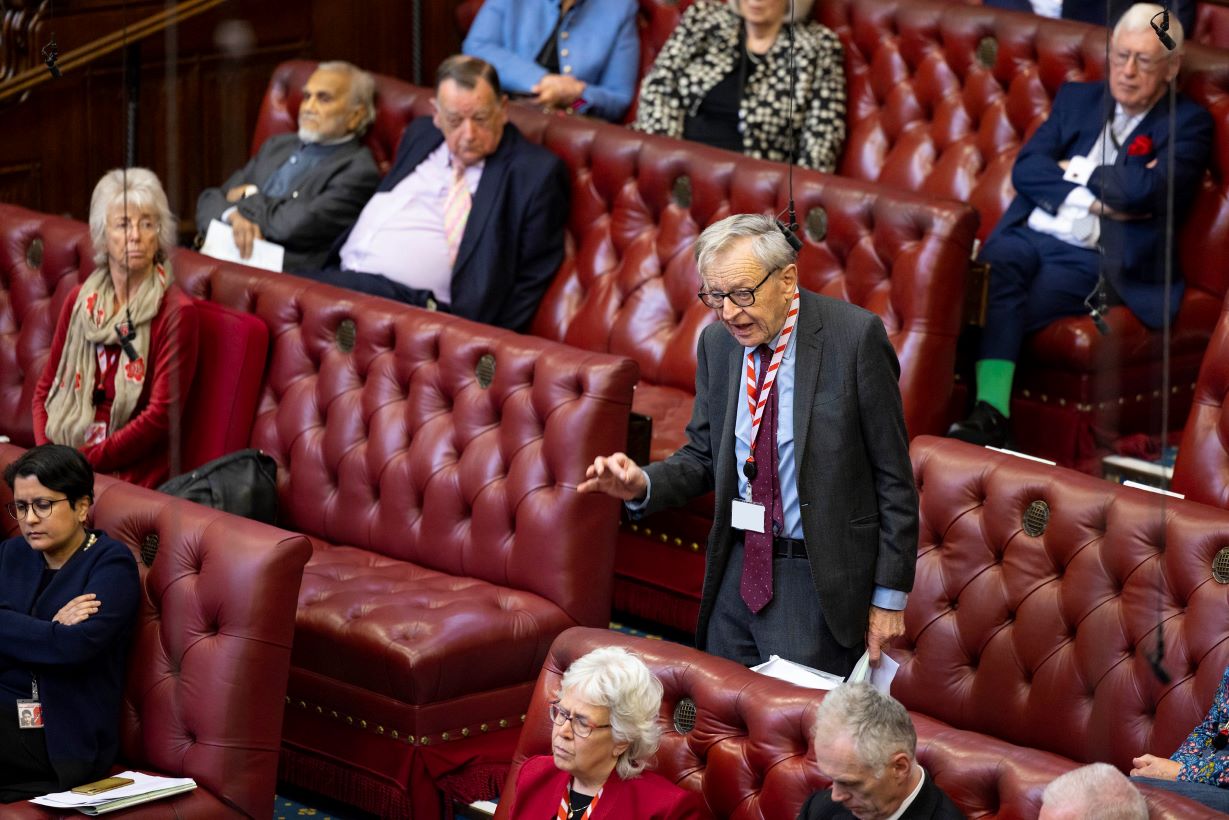After only three meetings, the European Political Community is losing momentum, writes Derrick Wyatt. Whether Rishi Sunak or likely successor Keir Starmer hosts its next summit in 2024, they should urge G20-style and other reforms such as working groups, taskforces, visits by leaders of non-member countries, and post-summit communiqués.
The European Political Community (EPC) was launched on the initiative of French President Emmanuel Macron. It held its first three meetings in the space of a year, the last being in Granada on 5 October 2023. The Granada summit was not a success, with one blog describing the way ahead for the EPC as being “ambition or oblivion”.
The UK is scheduled to host the EPC’s fourth summit in spring 2024. Dogged by poor opinion poll ratings, the Sunak Government might rule out ambition for a body which sounds too “European” for many of its supporters. That would be a mistake. If Sunak plays host, he will make sure that irregular migration (a.k.a. “stopping the small boats”) is high on the agenda, but reform of the EPC should be on the agenda too. Relaunching President Macron’s favoured project would make short-term sense for Sunak as well as longer-term sense for the EPC. It would equally make sense for Keir Starmer if an early election propelled him into Number 10 before the summit took place.
If Sunak plays host [to the EPC summit], he will make sure that irregular migration (a.k.a. “stopping the small boats”) is high on the agenda.
Leaders of more than 40 countries have attended EPC summits so far, along with Presidents of the European Council, the European Commission, and the European Parliament, and the EU High Representative for Foreign Affairs and Security Policy.
The summits to date have allowed President Zelensky of Ukraine to meet European leaders and seek their support in resisting Russian aggression, and they in turn have pledged that support. This has proved a unifying theme which has helped hold the EPC together. Summits have also provided the 10 countries seeking EU membership with opportunities to meet the leaders of EU countries and to network with them.
A summit marred by absences and a row over the agenda
Granada was the summit where expected talks on the Armenia/Azerbaijan conflict – following on from meetings in the margins of the first two summits – failed to materialise. The President of Azerbaijan did not attend the Granada summit, nor did his ally President Erdoğan of Turkey, who had “caught a cold”. This was the second EPC summit missed by Erdoğan.
In the run-up to the Granada summit, Rishi Sunak and Italian Prime Minister Giorgia Meloni were reported to be angry that host country Spain had refused to put the issue of irregular migration on the summit agenda. This led to Sunak refusing to attend the main press conference which was then cancelled by Spain’s prime minister. Sunak and Meloni went on to co-host a meeting on irregular migration in the margins of the EPC summit which produced an eight-point plan also supported by Albania, France, the Netherlands and the European Commission. President Macron is reported as saying that all EPC countries would be invited to seek agreement on irregular migration at the 2024 summit.
The Turkey factor
As well as promoting general cooperation between its members, the EPC was designed to create partnerships between the EU on the one hand and Turkey and the UK on the other. Both are important to the EU from the point of view of defence and foreign policy, with Turkey providing the greater challenge.
Turkey, which boasts an inadequate democracy and a poor human rights record, has dragged its feet over agreeing to Swedish NATO membership, and describes Hamas as freedom fighters rather than terrorists.
Yet these divergences from the ideals of the European mainstream are divergences from the NATO mainstream too, and few doubt that Turkey is better inside the tent than outside it. The EPC may face a choice of offering Turkey some sort of specific role to keep it interested, or seeing more absences from summits.
EPC Reforms of the right sort could portray Sunak to a home audience as projecting British influence abroad rather than deferring to the EU.
French diplomat Pierre Vimont argues that the UK could play an important role in shoring up the EPC, and is right to caution that the UK should not make migration the sole focus of the next summit. Reforms to the EPC should also figure on the agenda. Reforms that would increase the EPC’s impact and profile could appeal to European partners, and reforms of the right sort could portray Sunak to a home audience as projecting British influence abroad rather than deferring to the EU.
Reforms that could make the EPC more effective
I suggested in an earlier blog that continuity could be provided for EPC summits by its adopting the European Council “trios” system. This would mean the host country of each summit working with the past host and next host on agendas and organisation. British Diplomat Nick Heath referred in a recent panel discussion to possible use of the “troika” system in the EPC. Troikas are the version of trios practised by the G20. If the EPC continues to meet more regularly than the G20, the “troika” might better be a “quintet”, as the European Parliament recently proposed should be the case for the European Council’s rotating Presidency.
Another positive import from G20 practice would be working groups, which would meet between summits and carry forward discussion on their allotted agendas. Working groups would consist of “sherpas” – representatives of national leaders who would normally be senior officials.
A working group could consist of all members of the EPC or some of them. Working groups would carry forward work on draft statements of position for consideration by national leaders at the next summit. This would link into remedying a deficiency of the EPC to date – the lack of an end-of-summit communiqué. Having draft statements of position to work towards would focus the energies of working groups and summits, even if final declarations contained both consensus elements and elements summarising different positions within the EPC.
A reform beyond G20 – the taskforce
Action linked to EPC summits has to date been action by a group of countries meeting in the margins. That is true of the decision of France and the UK to resume France/UK summits, the agreement of Azerbaijan and Armenia on a civilian mission alongside their border, and the plan agreed by the Sunak/Meloni mini-summit on migration and related organised crime.
This might point to another possible innovation for the EPC – the “taskforce” – a group of states which might want to agree a political plan of action and implement it within the framework of the EPC. The Sunak/Meloni group on irregular migration might, for example, evolve into a taskforce to combat people-trafficking. Another possible candidate for taskforce treatment would be Ukraine, with a focus on both defence and diplomacy.
Taskforces could be staffed by sherpas and hold mini-summits at EPC meetings. Taskforces might also hold mini-summits between regular EPC summits. Involving Turkey in a taskforce could nudge the country’s government towards closer engagement with EPC partners.
A G20-style reform to give the EPC a global profile
The G20 invites leaders from non-G20 countries to attend its summits, and the EPC could do the same. The economic and security interests of its members are not confined to Europe, and extend, for example, to the Indo-Pacific region. The EU has held two Indo-Pacific Forums at foreign minister level. On the security front, China poses a threat. France and Australia committed earlier this year to supporting security and stability in the region, a German military source described Australia as a “like-minded partner”, and the UK is a member of the “Five Eyes” intelligence alliance, which includes Australia and New Zealand. Australia has provided military vehicles and training to Ukraine, and its joint commitment with France covers the supply of artillery shells to Ukraine. The UK has signed a trade agreement with Australia, and the EU would also like to do so, despite talks collapsing recently.
The next EPC summit could address Indo-Pacific links, and Australia’s Prime Minister Anthony Albanese could be invited to attend. Another possibility would be Canadian Prime Minister Justin Trudeau, who is chair of the Trans-Pacific Partnership (CPTPP) for 2024 and has supported Ukraine’s bid for membership. The UK joined the CPTPP in 2023.
If the Sunak Government urges the EPC in the direction of global engagement and offers G20-style reforms that make the EPC less chaotic, it should not provoke too much ire from its Eurosceptics, and it would take the EPC along the path to ambition rather than oblivion. That same agenda would suit Starmer if he inherited it or hosted the summit himself if an early election gave him the opportunity.
If the Sunak Government urges the EPC in the direction of global engagement and offers G20-style reforms that make the EPC less chaotic, it should not provoke too much ire from its Eurosceptics, and it would take the EPC along the path to ambition rather than oblivion.
With EU foreign policy more aspiration than reality, and key European allies likely to remain outside the EU anyway, Europe may need its own “United Nations”, to seek consensus where it can, and form coalitions of the willing where it cannot.
All articles posted on this blog give the views of the author(s), and not the position of LSE British Politics and Policy, nor of the London School of Economics and Political Science.
Image credit: Frederic Legrand – COMEO on Shutterstock







